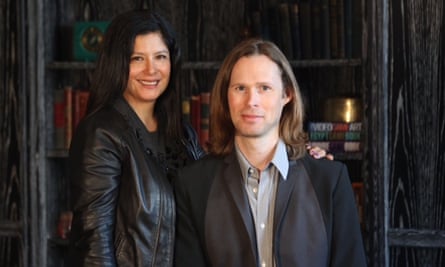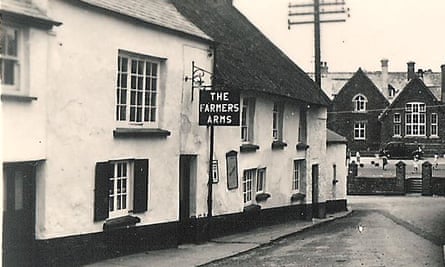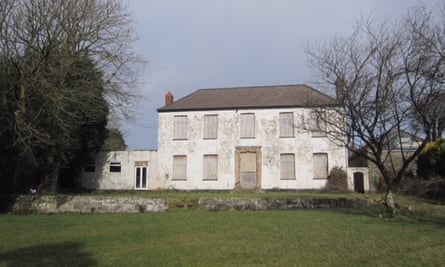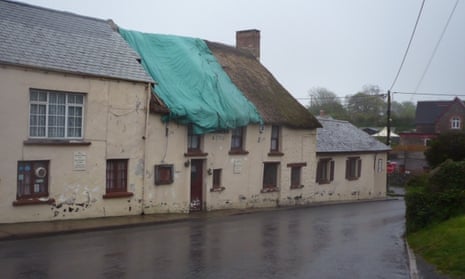Woolsery in north Devon has all the features that might be expected of the present-day British village: towering hedgerows bordering winding lanes, tidy culs-de-sac bearing regimented rows of bungalows and, in the centre of the village, the medieval church, the empty listed building and the boarded-up pub.
Sonia Hamilton, vice-chairwoman of the parish council, gestures at the listed building, known as the Manor House. “The state of that and the pub was depressing,” she says.
On this blustery August day, however, there are signs of change. Workers in hard hats mill around, hoardings are about to go up around the Manor House and the dilapidated pub is sheathed in tarpaulin. Last week planning permission was granted to convert the Manor House into a 19-room hotel, while restoration of the Farmers Arms pub to something approaching its former glory is due to be completed by the end of next year.
For unlike other villages across the country facing the plight of dwindling shops and services, coupled with declining populations and rising house prices, Woolsery (also known as Woolfardisworthy) is the unlikely beneficiary of the largesse, coupled with some business savvy, of Michael Birch, a laidback tech entrepreneur who lives in San Francisco.

Birch, who with his wife Xochi founded and then sold the social networking site Bebo, was born in Cambridgeshire but spent much of his childhood visiting relations in Woolsery, and there are members of six generations of his family buried in the churchyard. He was alerted to the village’s plight by his sister, Hilary, and decided to spend some of the £300m nest egg generated by the sale of Bebo on preserving the village.
“What he’s doing is madness, of course, but he knows his pubs,” said Hamilton, who set up an action group with her husband to save the pub. Birch has professed to having fond childhood memories of the Farmers Arms, and bought the interior of an English pub and transplanted it to a club he set up in San Francisco. The irony of someone who made his fortune by creating a virtual social space choosing to invest that money in a physical social space goes unremarked.
“He’s been good to his word, and everything he’s said he would do he’s come through and done it,” she said. “He’s spent a heck of a lot of money on it. He could become the local squire, I suppose, but it comes down to his personality and that’s not really him. He’s not coming here to lord it over us.”
Birch also bought the fish and chip shop next to the pub, where manager Jay Oyarzabal enthused about working for him. “This is the spearhead of the operation,” said Oyarzabal, standing behind the counter before a blackboard offering fresh fish from nearby Ilfracombe and pulled pork hotdogs.
“It’s not like working for a company,” said Oyarzabal. “It’s like family. I don’t have to turn a profit here. That’s not Michael’s thing. We break even. What he cares about is having it for the village.
“It’s been blown up with people saying he’s the saviour of the broken village. The village is lovely as it is, but we’re incredibly lucky. I don’t think that anyone but a multimillionaire could do what he’s doing.

Next door, in the village shop, owner Andy Fryatt said that he had already seen the benefits of Birch’s activities. “The guys working on the site come in here to get bits and pieces, then the new businesses in the village will create jobs, there will be an impact on house prices, the whole package. There have been several remarks about dying villages that have put people’s backs up. In the centre of the village this shop was last man standing. We’ve been keeping the heart of the village beating. Now there’s going to be someone else.”
He is another unusual figure in the village’s atypical story. While 200-300 village shops close every year, Fryatt, despite not having a background in retail, runs a thriving business.
“Village retail has been in long-term decline for more than 20 years,” said Kenneth Parsons, chief executive of the Rural Shops Alliance. “In the past you could be an amateur but now customers don’t take prisoners; they expect high standards, supermarket-style standards.”
Others point to transport and housing as causes of the decline of many villages, and even Hamilton admitted that one potential downside to Birch’s investment could be an increase in house prices.
“It is great to see someone so clearly attached to the village aiming to give it a new lease of life, and restoring places at the centre of the community,” said Shaun Spiers, chief executive of the Campaign to Protect Rural England.
Referring to research showing that only one in 10 rural houses were affordable to the local population, he said: “This of course has a knock-on effect. Many local people are unable to afford to stay and patronise the pub or shop, or send their children to the local school. Too many villages are being sealed off. Villages should be beautiful, but they must be vibrant communities full of life too.”

Hamilton, standing next to what will become a much-needed village green linking the school to the church, pondered the fate of Woolsery. “Is it a village in decline? As a community I don’t think it is, but the pub is a real centre. At the moment we’re spread to the four corners. It’s nice seeing it coming back to life.”
Her thoughts are given an academic sheen by a study into the contribution of local pubs to rural communities published at the end of 2014 by Northumbria University in Newcastle. “The English rural pub is not simply a place for drink, it has become a hub for the community’s infrastructure offering events, support and friendship,” the report found. “Pubs function as physical hubs which foster engagement and involvement among the community, as well as creating jobs for locals and local suppliers.”
Carol Bonnefin, who has lived in Woolsery for more than 30 years, was more straightforward. “What we need is a pub, and we need it now,” she said. “The Farmers Arms was somewhere you could go and have a pint. Tuesday evening was bell-ringing. You could do that and then go in the pub. It was the centre of the village. They used to hold parish council meetings upstairs, and the assizes.”
Hilary Birch, the entrepreneur’s sister, agreed that the value of the pub and the hotel were greater than mere bricks and mortar. “It’s incredibly important to have these community buildings in a village,” she said. “It’s where people get a sense of community and of belonging.”

Comments (…)
Sign in or create your Guardian account to join the discussion